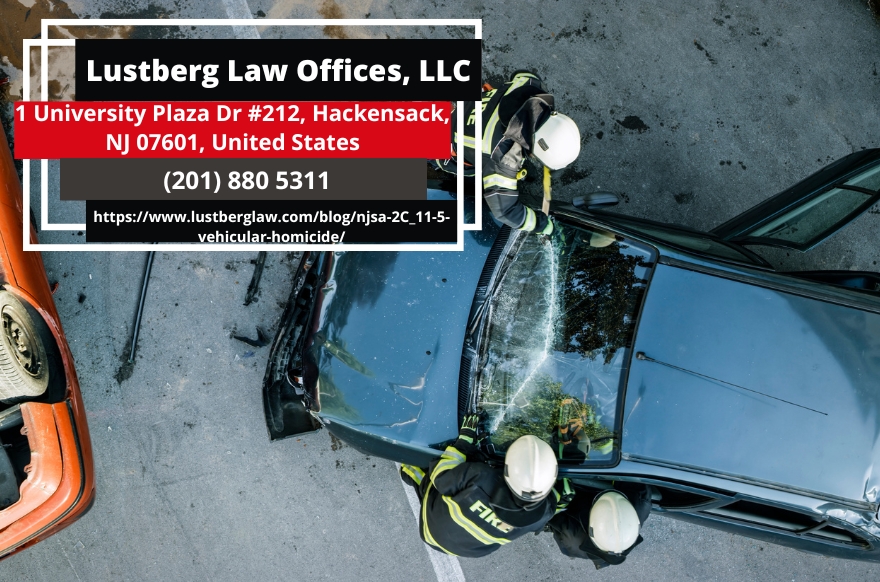New Jersey criminal defense attorney Adam M. Lustberg (https://www.lustberglaw.com/blog/njsa-2C_11-5-vehicular-homicide/) offers detailed legal insight into N.J.S.A. 2C:11-5, the statute defining vehicular homicide in New Jersey. As outlined in his article, vehicular homicide involves causing the death of another person through the reckless operation of a motor vehicle. With potential penalties that include lengthy prison terms, steep fines, and lasting personal repercussions, this charge represents one of the most serious motor vehicle-related offenses in the state.
Lustberg, a seasoned New Jersey criminal defense attorney at Lustberg Law Offices, LLC, emphasizes the severity of the consequences tied to vehicular homicide charges. The offense may be charged as a second-degree crime, with penalties ranging from five to ten years in prison and fines up to $150,000. In cases where aggravating circumstances are present, such as intoxicated driving near a school zone, the charge can escalate to a first-degree crime, increasing the potential prison term to as much as twenty years and fines up to $200,000. The New Jersey criminal defense attorney discusses how the classification and sentencing are influenced by a combination of factors, including location, driver behavior, and prior legal history.
According to New Jersey criminal defense attorney Adam M. Lustberg, "Understanding these distinctions is crucial, as the presence of specific factors can significantly influence the severity of charges and the corresponding penalties in vehicular homicide cases in New Jersey." He explains that while intent to kill is not required for a conviction, recklessness must be clearly demonstrated by the prosecution. This includes consciously disregarding a substantial and unjustifiable risk that results in the death of another person.
The law considers several behaviors as presumptively reckless, such as driving while intoxicated, falling asleep at the wheel, knowingly driving while fatigued, or engaging in distracted driving, including cellphone use. These circumstances significantly increase the prosecution’s ability to argue that the driver acted recklessly.
Lustberg explores the ways in which a defendant’s conduct is scrutinized in vehicular homicide cases. He explains how the prosecution must not only establish the reckless nature of the defendant’s actions but also prove that those actions directly caused the fatal incident. He notes that the statute applies regardless of the type of motor vehicle involved—cars, trucks, boats, or other motorized vessels are all subject to the same legal scrutiny under this law.
In his analysis, Lustberg identifies several defense strategies available to those facing vehicular homicide charges. These include challenging the evidence of recklessness, questioning whether the defendant’s actions directly caused the death, and identifying any violations of constitutional rights during the investigation or arrest. For instance, unlawful traffic stops, improper interrogation practices, or illegal searches can lead to evidence being excluded from the case.
He also discusses how vehicular homicide convictions fall under New Jersey’s No Early Release Act (NERA), meaning that 85% of the prison sentence must be served before parole eligibility. This makes the consequences even more significant for those found guilty. Furthermore, such convictions often result in the suspension or revocation of the driver’s license, and these repercussions can last for years or become permanent depending on the case.
The article delves into the long-term implications of a conviction beyond legal penalties. These include challenges with employment, housing, and social relationships due to the criminal record associated with vehicular homicide. While expungement may be an option in some cases, the process is complex and not guaranteed.
Adam M. Lustberg underscores the importance of timely legal intervention. He emphasizes that legal representation plays a vital role not only in understanding the charges but also in building a defense. From gathering evidence to disputing the prosecution’s claims, having a knowledgeable advocate can be a determining factor in the outcome of the case.
At Lustberg Law Offices, LLC, the legal team is committed to defending individuals charged with serious offenses like vehicular homicide. Lustberg encourages individuals facing such charges to act swiftly in securing counsel and preparing their defense strategy.
Facing a vehicular homicide charge is one of the most serious legal challenges a person can encounter. However, with the support of legal representation and a strategic approach to defense, individuals can challenge the allegations and seek the most favorable outcome possible under the law. Taking immediate legal steps is often the first move toward protecting one's future.
About Lustberg Law Offices, LLC
Lustberg Law Offices, LLC, represents clients in a wide range of criminal cases throughout New Jersey. Led by Adam M. Lustberg, the firm provides legal defense for felony charges, including vehicular homicide, with a commitment to strategic case preparation and informed legal advocacy.
Embeds:
Youtube Video: https://www.youtube.com/watch?v=xReZ_icxtKQ
GMB: https://www.google.com/maps?cid=17248268094099978177
Email and website
Email: alustberg@lustberglaw.com
Website: https://www.lustberglaw.com/
Media Contact
Company Name: Lustberg Law Offices, LLC
Contact Person: Adam M. Lustberg
Email: Send Email
Phone: (201) 880-5311
Address:One University Plaza Dr Suite 212
City: Hackensack
State: New Jersey 07601
Country: United States
Website: https://www.lustberglaw.com/





